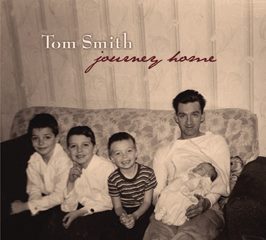 Tom Smith takes a gentle folksy approach to his vocal and musical delivery and that makes his new Journey Home CD an artistic success. His gravelly low tenor and nimble banjo and guitar picking make each of his songs play out like a pleasant journey across a familiar terrain. Listening to these tracks makes it easy to envision Smith singing these songs at a sing-along with a gathering of family and friends as well as at coffeehouses packed with fans.
Tom Smith takes a gentle folksy approach to his vocal and musical delivery and that makes his new Journey Home CD an artistic success. His gravelly low tenor and nimble banjo and guitar picking make each of his songs play out like a pleasant journey across a familiar terrain. Listening to these tracks makes it easy to envision Smith singing these songs at a sing-along with a gathering of family and friends as well as at coffeehouses packed with fans.
Smith opens this disc with “New Hampshire Wind” and within seconds he has the listener wrapped up in the charming whistle, gritty banjo notes, and the pleasant delivery of his New Hampshire memories. Joyce Andersen’s fiddle voicing drapes the song in an affectionate embrace with its sweet jaunty melody. The two-part harmony and the Oen Kennedy whistle embrace this tune with a magical warmth.
“To A Songwriter” weaves delicate piano, violin, and guitar into a tapestry of comforting sound while Smith graces it with his softly sung words. From there, Smith makes you feel like you’re having a conversation with an old friend. His voice is inviting and he makes you want to listen to what he has to say. Here he compares the songwriting experience to a religious one with an emphasis of giving of oneself. Listeners will be glad he takes his time on this one because you’ll want this song to last long.
“Phil’s Guitar” continues the conversational pace of Smith’s vocal approach. His smooth easeful glide through the chorus catches the ear with delight and his verses come across with a wide sweeping lushness that gathers the listener in with respect. He simply drapes this one in cheerful warmth and the emotion becomes as striking as the musicianship. Smith’s guitar is delightfully full of solid pretty notes that combine with Connelly’s banjo into a gritty, rangy backdrop for the vocals to launch off of.
Painterly lyrics adorn “A Fiddle With A Broken String” with images of a historic battle between good and evil, war, recovery. Smith conjures a strong sense of a wounded warrior coming home from war only to suffer internally from a loss he cannot ever recover from. Andersen’s fiddle reaches enormous highs in its ecstatic expression of grief and sorrow. She makes her instrument just cry out with a sense of intolerable pain. It wouldn’t be surprising to see this piece utilized in a motion picture in the not too distant future.
Smith’s title track “Journey Home” glides on the strength of its vocal harmonies. Not only do all those voices sound wonderful together, they move upward and onward with a gust, a lift, that carries them far in the listener’s imagination. “The Jolly Glazier” is a playful tune that makes you want to sing along to the story about a window worker. The jaunty rhythm in the banjo and lyrics get a warm boost from the feeling Smith infuses it with when he expresses his witty observations about his day job: “This antique ladder is a wobbly wreck/I’ll be lucky if I finish with a one-piece neck.”
Smith’s Producer Seth Connelly tinkles a beautiful piano melody on “Annie On The Stairs” while Smith regales the listener with his household recollections of loose, noisy stairs. He won’t fix the stairs that his wife keeps bugging him to repair because the sound reminds him of each family member who has traveled up and down them over the year. Beautiful and perfect backing vocals from Mally Smith add to the lovely textures so well here, it’s a treat for the ears.
The conversational flow works again on “A Folksinger’s GPS.” Over a bed of sprightly guitars, banjos, and mandolin notes from Connelly, Smith discusses the paths of life and how we all need to “recalculate” after hitting a fork in the road. His witty chorus also takes turns that are unexpected but make sense once he goes there. Like many empty nesters, his quiet house has to receive grown children with children of their own, giving him pleasant grandchildren but depriving him of a simple retirement. It’s the way Smith accepts these changes with maturity that shows character and a witty realization that we can only go with the traffic flow of life.
“Swallowed By The Hole” is a tale of disaster at the Knox coal mine in Port Griffin, Pennsylvania when Smith was but nine years old. Never maudlin, Smith sings and plays this one with earnest straight-forward details, and the emotion is in the details, and in Smith’s smooth, respectful vocal approach. Ever running banjo notes carry the listener along through a nightmarish landscape recalled by the mournful survivors. Andersen’s mournful fiddle creates another layer of moodiness in this tragic tale and her meaningful melody shows respect for the narrative and its severe conclusion.
“Working Poor” is graced by Billy Novick’s graceful, unobtrusive clarinet melody, its notes gently humming with authenticity in this song what about truly makes a man rich. This song will surely grab you by the heart as Smith paints a vivid portrait of his father’s quiet struggle to make ends meet, a struggle fought both externally and internally “But for that church on Bowdoin Street/We could not bathe, we would not eat/Just mac and cheese, my children cry/They eat the cheese, I eat my pride.”
“Lick My Face” finds the songwriter at his best. Smith conjures true humor when he describes a songwriter assignment to write a tune using the phrase “Lick My Face.” Smith has his dander up about having to use such a vulgar sounding phrase and his wit focuses on the universal experience of impending public humiliation. Yet, he meets the challenge head on, whipping up a song that pokes fun at the assignment, and he actually sounds peeved at the end of the piece, an irritation he expresses with tongue in cheek humor and also honesty.
Smith is quietly beautiful and contemplative on “That Last Folksinger,” a melodic joy made up of sweet notes from acoustic and electric guitars. Smith recounts his chance encounter with an older folk singer who regaled him with tune and words after a harrowing automobile accident. The debt Smith feels he owes this more seasoned musician infuses this song with tremendous emotional depth. Not only did the last folksinger take Smith in, he gave him a gift of music from a master and listening to the old man became a transformative event. It is all heartily rendered here and Smith passes on a similar experience to his own listener with his honest revelation.
Smith closes out his disc with the amiable ditty “Street Singer’s Heaven.” Its endless roll of sprightly banjo notes from Eric Royer adds joyful support to the chirpy, upbeat view Smith has of the next life. The tune is full of life and full of instrumentation, and Smith leaves the listener on a happy note as he looks forward to a blissful eternity in a place that’s good for street players.
Smith has certainly come up with one of the strongest singer-songwriter CDs of 2011. Every word and feeling is a treasure and the song craft shows true mastery. Smith wasn’t flying alone. His exciting guest musicians and harmony vocalists include Alle Santiago and Sean Staples.


Bill,
Thank you for the excellent review of ‘Journey Home’. It is so refreshing to read substantive comments from someone who has obviously taken extra time to listen thoughtfully to every track of a CD. You have encouraged me to continue to continue creating and sharing music. That is a good thing. 🙂
Peace and music!
~ Tom
[…] new CD, Journey Home has been released to the world. Early reviews have been very positive. Bill Copeland Music News writes “Tom Smith’s CD Journey Home offers emotional joy and solid craftsmanship. […] Smith […]